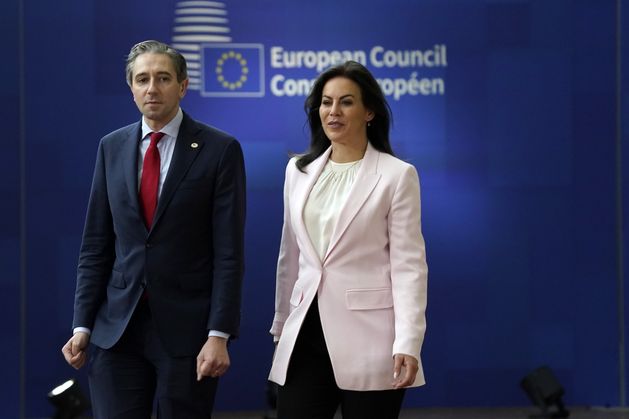On his way in, the Taoiseach Simon Harris told reporters that the latter was something in particular he wanted to raise.
During his contribution on the conflict in the region, the Taoiseach told leaders there was no evidence that Israel was listening to its allies and asked at what point would it be considered a “tipping point”, and what more had to happen for Israel to listen.
While he acknowledged that within the room, there were differing opinions on the war, he said they all agreed that a ceasefire was needed, along with it a two-state solution.
“We come to meetings like this, well intended, on a regular basis and fine words are said, but levers that could be pulled have not been pulled”, the Taoiseach told reporters before the meeting, referring to the possibility of a ceasefire.
The escalation of the conflict in Lebanon was also a focus and again, differing views were apparent.
However, there seemed to be a change on how Israel’s attitude to the conflict is being perceived by EU leaders, with suggestions that it was becoming less and less acceptable in the room.
While some focused on what to do, there was a growing acknowledgment that Israel is not listening to concerns of international leaders.
There was also outrage in regards to the challenge of getting humanitarian aid into Gaza, with much time spent on discussing how to access and distribute aid in the region.
However, as discussions got underway it was the contentious issue of migration that was under the spotlight in Brussels.
It comes at a time when some EU countries are taking what have been deemed controversial decisions to stem the flow of migrants to their borders.
Just this week, Italy begin a new scheme, which will see migrants stopped near Italian waters and diverted to Albania, where Italy has spent €650 million building two reception centres.
Here, asylum seekers wait for their applications to be processed. If accepted, they will move to Italian land. But if rejected, they will be sent to their home country.
It has been a controversial programme that aims to deter irregular arrivals and has been criticised by human rights groups.
But at the EU council, there is an awareness that the migrant crisis is not going away.
Two days before the council meeting, European Commission president, Ursula von der Leyen called for the idea of “return hubs” outside the EU to be explored, citing Italy’s Albania scheme as a possible model.
Asked his views, the Taoiseach said there should be a willingness to consider “innovative solutions”, as long as those solutions were in line with international law and human rights.
The Prime Minister of Poland Donald Tusk was one of the first to address fellow leaders and spoke at length over the specific challenges facing his country.
Earlier this week, Mr Tusk and the Polish government said it would temporarily suspend the rights of asylum seekers arriving in the country, despite it going against European rules and international law.
The country has seen thousands of people crossing over Poland’s border with Belarus. Belarus and Russia have been accused of weaponising migration, encouraging migrants to enter the EU to destabilise the region with Poland feeling the brunt of the strategy.
It was on this that Mr Tusk spoke, explaining his country’s position to EU leaders, that it was now a national security issue.
When the meeting concluded, leaders agreed to ask the European Commission to draft legislation to speed up the return of migrants as a matter of urgency.
Ukrainian President Volodymyr Zelenskyy, as a guest to the council meeting, took the opportunity to present his “victory plan” to the assembled leaders.
While there was support in the room, not everyone agreed with the president’s plan. Ahead of the council meeting, Hungary’s Prime Minister Viktor Orbán described the plan as “more than frightening”.
Asked during a press conference on Thursday if he had an opportunity to meet with Mr Orbán and how it went, President Zelenskyy said “we have greeted each other, that is already good”.
Mr Zelenskyy also spoke about the need for Ukraine to join NATO and urged the EU leaders to extend an immediate invitation.
But it was also the revelation that North Korean soldiers could be introduced into the conflict on the side of Russia that he took the time to address.
According to Ukrainian intelligence, 10,000 North Korean soldiers are being trained to join Russian forces. This, Mr Zelenskyy said, was the first time in this war, another country was providing people to support Russia.
“This is the first step to a world war,” he said.
Source link : http://www.bing.com/news/apiclick.aspx?ref=FexRss&aid=&tid=6711c6ef24964dd4a980835d34cc7cd2&url=https%3A%2F%2Fwww.independent.ie%2Firish-news%2Fpolitics%2Fmigration-dominates-eu-council-meeting-as-taoiseach-tells-leaders-israel-not-listening-to-allies-over-conflict-concerns%2Fa1853568741.html&c=16739248936799170370&mkt=de-de
Author :
Publish date : 2024-10-17 17:30:00
Copyright for syndicated content belongs to the linked Source.
